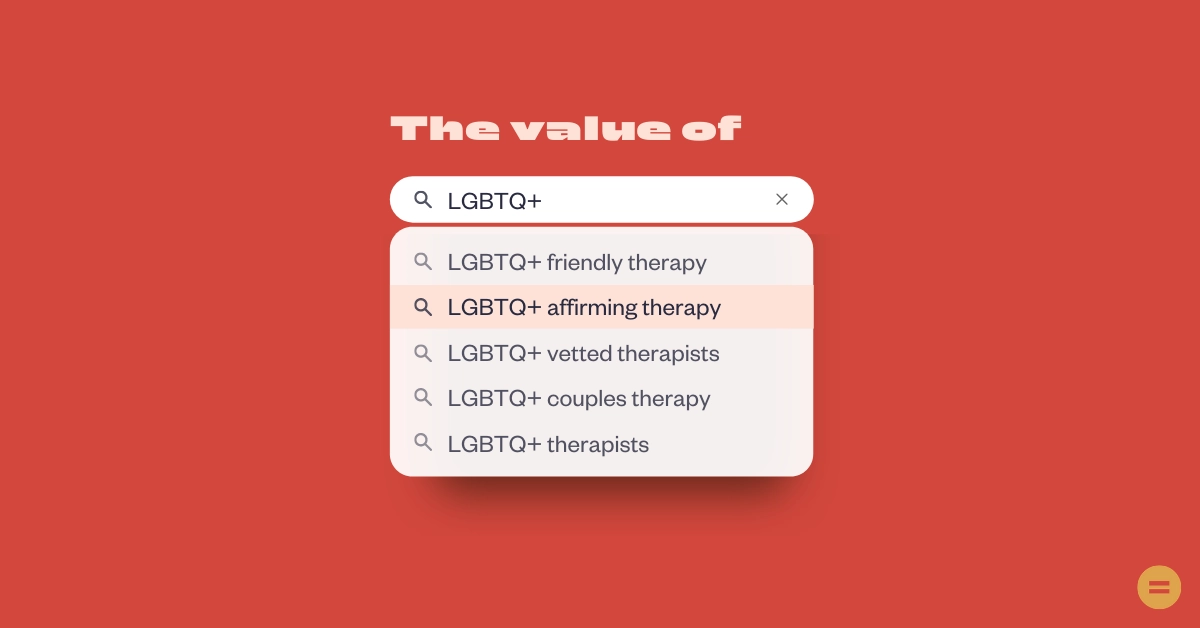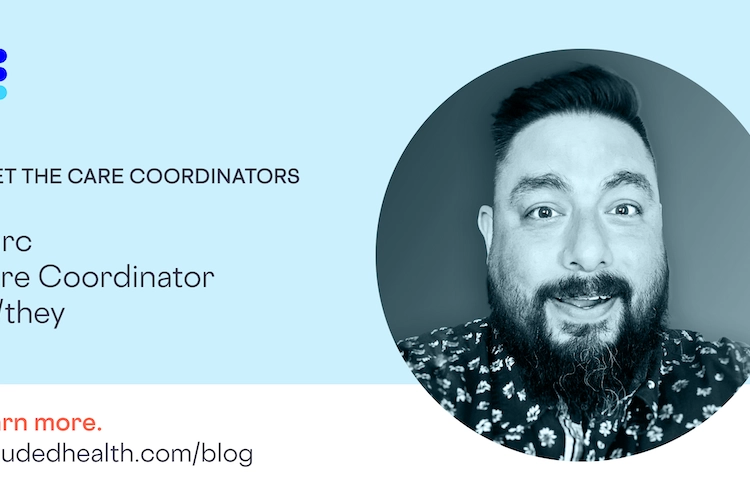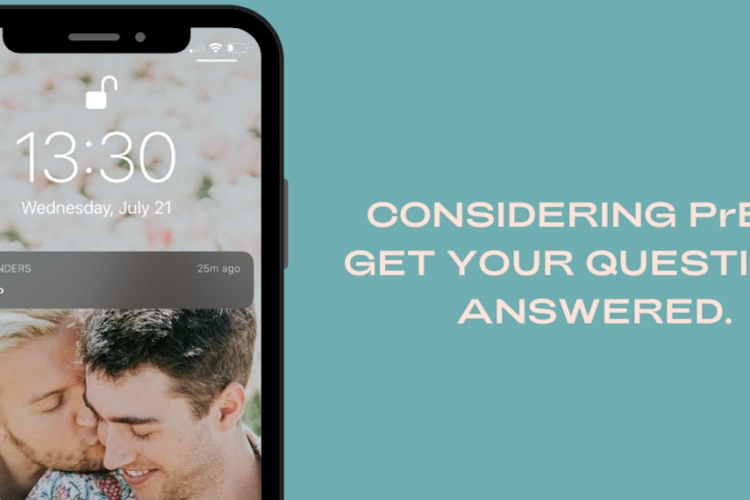This blog is the second in a series celebrating Mental Health Awareness Month. Read Part 1 here: 5 ways LGBTQ+ people can practice self care and community care.
Our mental health and wellbeing is important, and sometimes the best way to take care of our mental health is with the support of a professional. We deserve mental healthcare that is culturally competent in providing treatment for gay, queer, lesbian, bisexual, and trans people’s experiences. LGBTQ+ affirmative therapists not only offer the tools we need to overcome any challenge but can help us live our most authentic lives.
What is affirmative therapy?
Affirmative therapy is more than just accepting of your identity—it’s care from a competent provider with knowledge and tools that apply to your specific experiences. It embraces all LGBTQ+ identities and addresses how heterosexism, homophobia, and transphobia can affect our daily lives. “Many of my clients are working through the trauma of being shamed about their sexuality or gender experience,” Seth Ambrose, a gay affirming therapist in California, says. “Having an affirming therapist means that that shame can be addressed sooner, in this peer to peer way,” he added. ”[A client may think] ‘if my therapist is queer or my affirming therapist keeps showing me that there’s no problem with my identity, then maybe it’s okay for me to be who I am out in the world.’”
“When I was growing up in my small, Texas hometown, I didn’t have many queer and trans friends that I could confide in,” Brian, a gay, Latinx man from New York, says. “And because of that, I never had the best foundation of camaraderie with the LGBTQ+ community,” he adds. “So when I began my search for a therapist, I had to consider what I should share about my life because I didn’t know whether I was going to be ridiculed or accepted in a session. My [affirming therapist] alleviated that stress and made me realize a stronger relationship with the LGBTQ+ community would benefit me. Now, I’m immersing myself more in the community and developing my own identity as a queer person.”
Denne, a care coordinator at Included Health, spends every day connecting members to affirming providers, including therapists. In one situation, Denne was working with a gender-expansive person who first reached out to them to find counseling. When Denne matched her with a provider, she hesitated to set up an appointment; she said she felt like an imposter who just “dressed up once in a while.” After a few conversations where Denne offered their full support, she made an appointment and, eventually, transitioned. “I’m thankful that I kept nudging this member, because if I hadn’t, she might not have started seeing that initial therapist who helped her embrace her identity,” Denne says.
How current systems impact LGBTQ+ care
Jay, a non-binary, queer person in Michigan, began their mental healthcare journey with a non-affirming therapist. “I told her I do drag and had explored ideas of gender, and she kept those parts of our conversation very short,” they say. As someone new to the therapy process, Jay kept an open mind. “By the third session, I realized that this isn’t how it’s supposed to be,” they say. “When I discussed my ex-boyfriend, she kept centering any struggles in my life to that relationship. She asked me ‘do you think you are the way you are because of your relationships with men?’ and said my sexuality was harmful to myself.”
Jay reported the therapist to her superiors and, after a six year break from counseling, found an affirming therapist that embraces their LGBTQ+ identity. “When I started seeking out treatment again, I wanted to make sure I was going to be taken care of,” Jays says. “So I went through my primary physician, who’s a part of a local LGBTQ+ focused health organization. I was put on a waitlist at first, but when I was given my new therapist’s intake form to fill out, they asked me what my pronouns were,” they added. “I had never been asked by a doctor before, so it was an easy decision [to become a patient] because of that.”
The experience of finding an affirming therapist changed Jay’s perspective of mental healthcare. “I used to see therapy through an objective lens that never involved intersectionality, which is interesting because I check off a lot of boxes,” they said. “It’s been amazing.”
(Read more about how this LGBTQ+ member found his ideal therapist.)
The value of an affirming therapist
Therapy doesn’t boil down to just affirming versus non-affirming, according to Ambrose. “A lot of LGBTQ+ people are looking for [a therapist] who identifies as queer or trans,” he says. “I do hear clients say things like ‘I had a really lovely therapist, but I couldn’t actually talk about my queer experience [with them].’ It’s been an important part of my practice to be willing to offer the self-revelation that I’m queer in an initial or second session because part of a successful treatment is the feeling of being seen, known, understood. In my practice, I work with a lot of gay men, and they might talk about the party they went to last week or registering for a marriage in a smaller town with their same-sex partner. There’s a sense of ‘he gets it’ that comes from my clients.”
The LGBTQ+ experience cannot be replicated through medical training. When queer and trans people don’t have to educate a therapist to get the treatment we need, we’re able to feel more comfortable. “That doesn’t speak to a lack of efficacy of therapists who identify as community allies, but rather the traumas that queer and trans people have sustained at the hands of a more heteronormative counterpart in the world,” Ambrose says.
“The right therapist is out there for everyone, which makes it all the more reason to do your research, try therapy out, and keep looking until you find the right one,” Brian says. “The whole process [of finding an affirming therapist] has taught me that there is no linear guide to having good mental health,” he adds. “It takes change, experimenting, exploring and investigating, and most importantly, always listening to your needs and meeting them accordingly.”
Affirming therapists, whether they belong to or are allies of the community, practice to improve the mental well-being of all LGBTQ+ members. As medical professionals, they understand the dynamic lives we lead and provide every queer and trans invidual the opportunity to heal and grow.
At Included Health, we strive to provide friendly and exceptional healthcare navigation services to the LGBTQ+ community. Learn more about our LGBTQ+ Health services for your employees, and please do not hesitate to contact us to #GetIncluded for your company, health plan, and community.
If you are an employee or member looking for assistance, please visit our LGBTQ+ Member Hub to get started.



